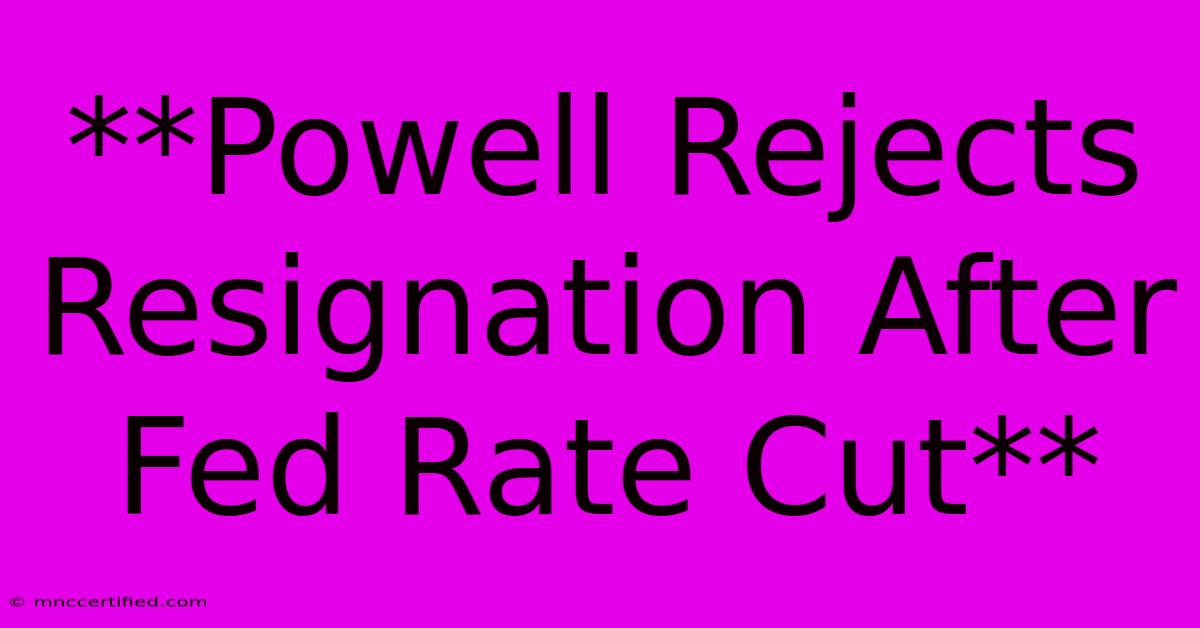**Powell Rejects Resignation After Fed Rate Cut**

Table of Contents
Powell Rejects Resignation After Fed Rate Cut: A Sign of Stability or a Gamble?
The Federal Reserve's recent decision to cut interest rates has sparked debate, but one thing is clear: Chairman Jerome Powell remains firmly at the helm. Despite mounting pressure from some quarters, Powell rejected calls for his resignation, signaling a steadfast commitment to navigating the economic landscape. This decision raises important questions: is this a sign of stability amidst turbulence, or a gamble that could backfire?
The Context: Interest Rates and Economic Uncertainty
The Fed's rate cut, the first since 2008, was aimed at boosting economic growth and countering a potential recession. However, the decision was met with mixed reactions. Critics argued that it was too little, too late, and that the Fed was playing catch-up with a deteriorating economic situation.
The pressure on Powell intensified as some voices called for his resignation, citing concerns about his handling of the economy and the Fed's communication strategy. These calls were fueled by the recent stock market volatility and the growing sense of economic uncertainty.
Powell's Stand: A Show of Strength or a Missed Opportunity?
Powell's decision to reject the resignation calls signifies a resolute stance. He believes in his ability to guide the Fed through the current challenges, and his continued leadership might provide much-needed stability and confidence in turbulent times.
However, this move also carries risks. Some critics argue that it is a gamble, a potential loss of momentum in the face of a potentially worsening economic outlook. They believe that fresh leadership might have been necessary to inject new ideas and approaches into the Fed's strategy.
Looking Ahead: What Does This Mean for the Economy?
Powell's rejection of resignation sends a clear message: he is committed to his role and the Fed's mission. This signals a continuity of policy in the near term, but it also raises questions about the Fed's ability to adapt to changing economic circumstances.
The next few months will be crucial in gauging the effectiveness of the Fed's rate cut and Powell's leadership. If the economy fails to rebound, or if market volatility persists, the pressure on Powell could intensify.
This situation underscores the complex and dynamic nature of the global economy. While the Fed's rate cut may have provided a short-term boost, the long-term consequences remain uncertain. Whether Powell's decision to stay on proves to be a stabilizing force or a misstep hinges on the unfolding economic landscape and the Fed's ability to adapt and respond effectively.
Keywords: Powell, Fed, rate cut, interest rates, resignation, economic uncertainty, stability, gamble, leadership, strategy, market volatility, economic growth, recession

Thank you for visiting our website wich cover about **Powell Rejects Resignation After Fed Rate Cut** . We hope the information provided has been useful to you. Feel free to contact us if you have any questions or need further assistance. See you next time and dont miss to bookmark.
Featured Posts
-
Joao Felix Christopher Conference League Goals
Nov 08, 2024
-
Barcelona Codorniu Partner For New Project
Nov 08, 2024
-
Day Of The Jackal Remake What You Need To Know
Nov 08, 2024
-
West Brom 0 0 Burnley Points Shared In Controversial Match
Nov 08, 2024
-
Internet Access In North Korea Early User Reactions
Nov 08, 2024